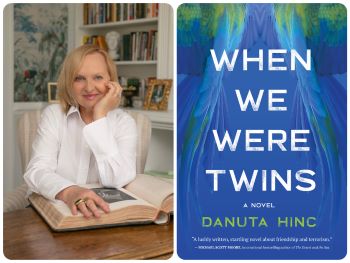By Morgan Musselman
This article was first published in The DC Line here. This article was produced within the New Book Critics project, a component of Day Eight’s 2022 The Crisis in Book Review conference.
Three recently published poetry collections explore themes of loss, devotion and self-love, demonstrating the art form’s capacity to express the depth of the human experience.
The Shomer by Ellen Sazzman; published in 2021 by Finishing Line Press (85 pages, $21.99)
A striking debut collection from poet Ellen Sazzman, The Shomer takes its title from the traditional Jewish practice of designating a guardian — a shomer — to watch over the body of a deceased person until burial, protecting them against desecration until they are safely interred. As poet-guardian, Sazzman guides readers through significant life events as well as daily routines; her poems offer glimpses into the realm of memory wherein loved ones are safeguarded.
Split into three parts, The Shomer first watches over the speaker’s familial relationships, the poems securing the memories of those once in her care — mothers, fathers, children and grandchildren — and protecting them from the erosive nature of time and forgetting. In this initial section — which begins with “To Chaya (1915-2014),” an elegy for her deceased mother — the speaker travels from orphaned adulthood to childhood and back again, exploring the relationships parents have with their children, each other and themselves. The poet’s reflections are deepened and complicated by her own experiences of aging and parenting. In “October in the Neonatal ICU,” the speaker directs these words to her newborn grandson:
Over stigmata pricked on your flesh,
I bend, touch your forehead.
The generations’ shared claim:
to swaddle you beyond suffering,
line your transparent manger
with the straw of names.
In these poems, loved ones’ bodies — eyes, hands and lungs — are preserved through memory along with hopes, failures and loves. Threads of forgetting and destruction expand to questions of tradition and rite in the collection’s second section, “The Body Sanctuary,” where the poems attend to old practices and rituals of life in the face of time, loss and persecution — particularly as they relate to Judaism. From “Seek and Hide in Prague’s Old Jewish Cemetery” to “Jewish Girl’s Guide to Guacamole” and “Renewing Vows in the Atlantic,” the speakers in these poems search for asylum in the spaces once occupied by other bodies — loved bodies, lost bodies, and former versions of oneself. In “Peeling the Orange,” for example, the speaker breaks open the skin of an orange and reminisces about the way her father did the same each morning throughout her childhood, concluding,
The peeling
releases nectar that clings to my fingers,
perfumes my palms for hours. Perhaps we can
tease out the pungencies, reconstitute
the fullness, un-seamed, returned to one another.
These spaces grow more tangible toward the collection’s end as Sazzman turns her eye to the physical, flesh-and-bone body as well as the material objects it handles and fills: a grandmother’s sealskin coat, for example, or another person’s thighs. This final selection of poems progresses steadily through themes of sensuality and pleasure as Sazzman recounts adolescent flirtations. In a reprieve from the collection’s generally heavier tone, readers get a fleeting taste of the author’s wry humor before moving to loss and unfamiliarity as she ruminates on the ways bodies begin to say their goodbyes. To watch over the body corporeal — our own and others’ — is to see damage and desire, fruit and rot, these poems suggest. But “Better to / welcome the wounding, no matter how deep the cut” than remain unscathed.
Sazzman explains her thematic choices in the collection’s introduction: “Under the best of circumstances the Shomer gains a glimpse into the liminal, into what happens in the space between love and loss, hunger and fulfillment, forgetting and remembering.” Though the collection’s final portrayals of memory are clouded by grief, nostalgia, age and human fallibility, The Shomer succeeds in its role as guardian, artfully preserving the poet’s love for those who welcomed her into this life and those whom she has welcomed in turn. Here, loved ones are held fast in memory, preserved through poetry, protected until we are all buried. And what a blessing to be so lovingly guarded by a poet as skilled as Ellen Sazzman.
Riffs & Improvisations by Gregory Luce; published in 2021 by Kelsay Books (33 pages, $19)
Music is the master key to emotion, declares Gregory Luce’s collection Riffs & Improvisations. Here, when music plays, fervent sentiment spills forth, filling the poems with earnest and reverential contemplations of sensuality, yearning, wistfulness, loss and, above all, love.
As these poems traverse emotions, so too do they span place and time, from a Metrorail station in “Music to It” — where the speaker perpetually searches for the right song to play in his life’s soundtrack — to awaiting divine judgment after death in “Richard Strauss in Purgatory.” Most of the poems portray a lone speaker isolated by time, death or his own thoughts, pondering music and the moods it conjures, each contributing a line in an ardent love letter to the art form.
In one of the collection’s more sorrowful pieces, “Satie in the Dark,” the speaker turns off the lights and plays Gymnopédie No. 1, intentionally invoking memories of “old lovers, my dead– / my father and mother / and the others.” It’s a solitary séance that reminds the speaker of his own inevitable death, only to be snapped out of his reverie by the start of a new song. Here and throughout the collection, as music opens the speaker to emotion, it also functions to facilitate eulogy and memory, linking past and present.
With a title such as Riffs & Improvisations, there comes an expectation that the poems within feature rhythms and meters, evoking the very compositions with which they are preoccupied, but most poems here are free verse without a noticeable musical pattern. Luce tends toward explicitness over subtlety when painting a scene and, rather than mimicking song, what many of his poems capture is the sensation of listening to music. In “Aspirins and Coffee,” Coltrane plays, and the speaker is consumed by the sound:
Jimmy’s bass notes step up my spine and thump
the base of my skull
Elvin’s sticks tattoo the back of my head from the inside
McCoy’s chords shatter like fine crystal behind my eyes
“a Love Supreme a Love Supreme”
and then Trane’s lines burn up from my gut like raw liquid sugar
like hot syrup like pure honey
To experience Riffs & Improvisations to best effect, readers might want to play aloud the music referenced therein as they read each poem. When the notes of “A Love Supreme” accompany “Aspirins and Coffee,” readers can truly feel the impact of the beat, their own fingers tapping in tandem with the speaker’s as he sits at his kitchen table.
Luce’s collection ends with a revisit to this song and these moving lines: “I try to work my pen / for Trane the way / he played his sax / for God.” This is Riffs & Improvisations at its finest: a poet composing in awe of others’ craft, enveloping himself and the audience in a love of music.
My Poetry Is the Beauty You Overlook by Kim B. Miller; self-published in 2020 (73 pages, $16)
Kim B. Miller wants more from you. And more for you, too. Demanding readers’ attention from the beginning, her collection My Poetry Is the Beauty You Overlook opens with a poem that ends with the following lines:
My name is poetry and I will never be what you want to hear
But truth cannot be ignored
Poetry is not what I do
Words are what I breathe and I decided to come exhale on you
Part poetry collection and part motivational guide, My Poetry presents the work of the first African American to serve as the poet laureate of Prince William County, Virginia. Emboldened by experience and the personalization of her craft, Miller is determined to speak her truth and inspire others to do the same.
My Poetry’s themes are wide-ranging, from the truth-telling role of poetry to the struggle against anti-Black racism. The collection incorporates an unconventional format: Each chapter explores a different theme through a sequence of one free-form poem, followed by a featured haiku, six more haiku, and finally a so-called “Kimism.” These Kimisms are candid sayings that clinch each chapter’s theme — for instance, “Some of you are too busy trying to explain your journey to someone who will not be going with you” comes at the end of a chapter urging confidence and self-love.
Given Miller’s professional experience as a motivational speaker, it is unsurprising that many of her poems adopt this style. Nearly every poem in My Poetry adopts a second-person point of view, addressing the reader directly. The many haiku are key examples of Miller’s motivational tone, as in the featured haiku of the chapter “Mom, Gone Too Soon”:
You cannot divide
Yourself into fractions to
Make someone else whole
This inescapable “you” present throughout the collection consistently demands more of the reader — more attention, more introspection, more accountability, and more love.
Miller’s haiku also exemplify her taste for playing with tradition. While adhering to the established five-seven-five syllable structure of a classic haiku, Miller often makes inventive modifications to the words’ arrangement within lines. Three times in the first chapter, she makes the two syllables of “poet” stretch from one line to the next. In “Judging,” she writes,
Just cause they don’t po-
et like you poet that doesn’t
mean they aren’t poets.
The splitting of po-et while sticking with traditional structure underscores Miller’s meaning: Poetry is malleable, and the liberties taken with art do not negate the writer’s artistry.
In this way, Miller has learned to claim more for herself, to declare her own love and praise — and she insists that her readers do the same. The opening free-verse poem in Chapter 8, “Poetry Is,” reads:
Poetry is unsolicited help
It holds us up when pain tries to erase our voice
It allows us to pour into emptiness and create peace
Like much unsolicited help, it can be tough to swallow. Bold, funny and earnest, My Poetry Is the Beauty You Overlook knows that there is beauty in truth and insists that you see it.
Morgan Musselman is a reader and writer living in Washington, DC. Morgan holds a bachelor’s degree in English Literature from the University of Iowa. Upon graduation, she moved to Washington, D.C. and began her current position working in the fundraising and communications department of a local nonprofit. In her free time, Morgan can be found at coffee shops around the city, desperately trying to clear up space on her to-read shelf, or at a bookstore undoing all her progress.





No Comments